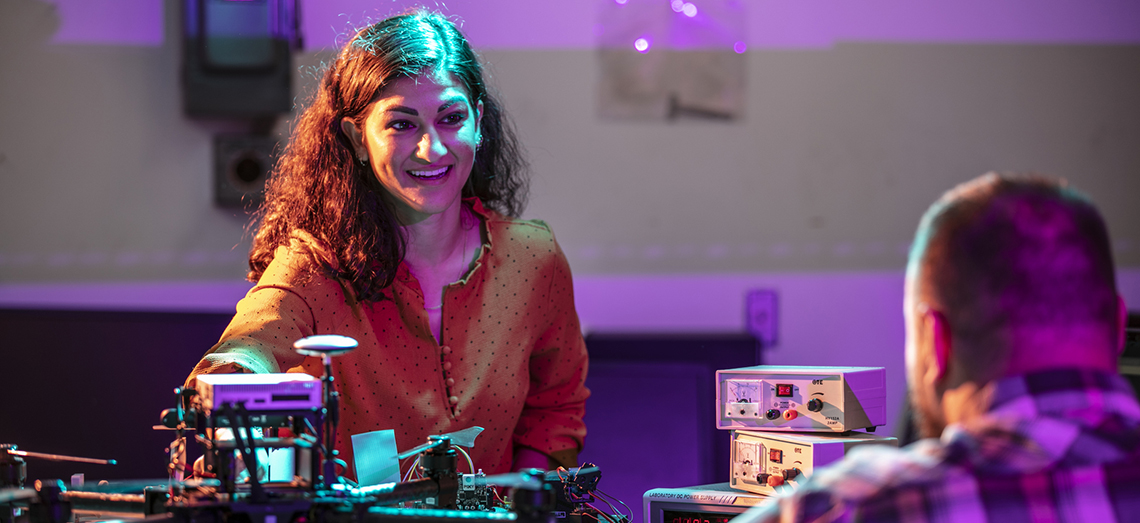
December, 2022
Quantum physics is one of the fastest growing scientific fields in both the United States and around the world. It follows then, that the 2022 Nobel Prize in Physics was awarded to Alain Aspect, John Clauser and Anton Zeilinger for their groundbreaking experiments with entangled photons that open a path to advanced quantum technologies.
“Any field recognized with a Nobel Prize has the recognition of the world as being at the forefront of important science, and quantum just got this boost,” said Charles E. Schmidt College of Science professor of physics Warner Miller, Ph.D. “It is already heavily funded and leveraged around the world. The field is moving into quantum technology applications. That is what FAU’s quantum drone project is all about.”
In concert with Qubitekk and L3Harris, Miller’s quantum drone is taking cybersecurity to new heights. His team is leading the United States’ efforts to deliver the first drone-based, mobile quantum network for unhackable wireless communication. Quantum protects information by the laws of nature and not just by a clever manmade code.
“In the quantum lab, I have state-of-the-art quantum entanglement sources and state-of-the-art drone optical systems,” said Miller.
The network includes a ground station, drones, lasers and fiber optics to share quantum-secured information. Today’s telecommunication networks use fiber optics, connected by laser beams from the ground and between planes and satellites — called fiber and free space optical networks. Drones are used to save lives, secure infrastructure, help the environment and thwart hostile military advances such as the war between Russia and Ukraine.
Miller is a retired lieutenant colonel, U.S. Air Force, who served honorably for 28 years and received a Meritorious Service Medal with Oak Leaf Cluster. He played a critical role in recently obtaining a $1.5 million Phase II Small Business Technology Transfer (STTR) federal grant awarded to Qubitekk. Miller also is collaborating with L3Harris, an agile global aerospace and defense technology innovator that has been involved in the project since 2019. Additionally, his lab receives funding through the Air Force Research Laboratory and the Air Force Office of Scientific Research (Defense University Research Instrumentation Program and Asian Office of Research and Development). Combined, his funding totals over $2 million.
Eventually, Miller, who also serves on the advisory board of the Quantum Alliance Initiative at the Hudson Institute, plans to incorporate quantum memory in the drones so that they can conduct error correction, relay and store information.
“We are just scratching the surface of something that is going to amplify into a lot of different applications,” said Miller. “This technology is not only going to be on drones or robots. Eventually, we will have this secure communication technology on buildings and satellites that will open up a free space optical link between them. The only limit is your imagination.”
In large thanks to FAU’s cutting-edge research lab, Miller’s students are graduating from Florida Atlantic with superior skill sets and are being heavily recruited by top-level companies across the industry and academia. It also helps that billions of dollars are being spent around the world to study the field of quantum physics.
Some of Miller’s former undergraduate students secured permanent quantum optics jobs at one of the country’s premier defense industry labs. Robert Snyder is in L3Harris in Houston, Texas, and Alexandra DeCesare and Joe Dodd are in L3Harris in Palm Bay, Florida. All 14 of Miller’s former students secured similar jobs in the quantum field or attended graduate school to further study quantum physics.
One Florida Atlantic alumna and former quantum lab student, Jasmine Jones will enter Georgia Tech’s Ph.D. program in Quantum Physics in fall 2023. Currently, Jones works at the Georgia Tech Research Institute as a junior quantum physicist in the Quantum Systems Division. Her job focuses on advancing discoveries and technologies in quantum computing and quantum sensing.
Interested in learning more about the growing field of quantum research? Visit www.physics.fau.edu.